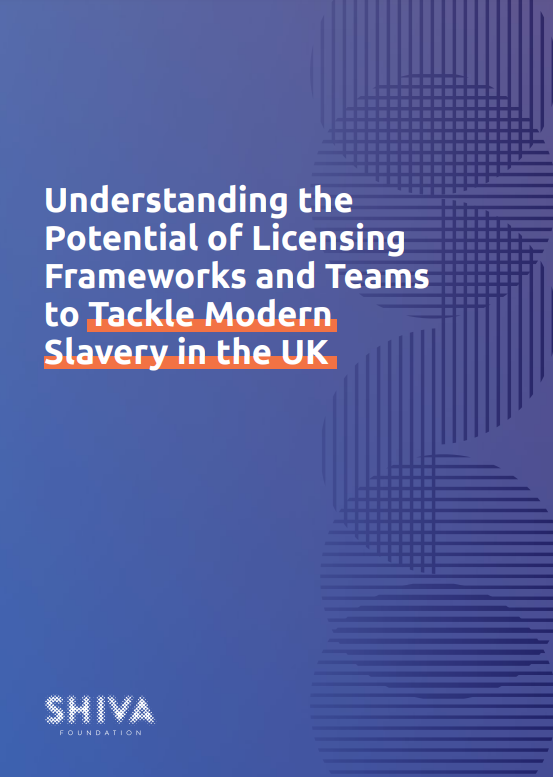Information on Cookies
To make the best use of our website, you'll need to make sure your web browser is set to accept cookies to ensure you receive the best experience.
For further information, please read our Cookies Policy.

Log In

In a concerted effort to address the pervasive issue of modern slavery within our local communities, Shiva Foundation is proud to announce the launch of their innovative report on Anti-Slavery Day 2023. The report, a comprehensive exploration of the role licensing frameworks and teams can play in addressing modern slavery, offers vital insights including policy recommendations for national and local government and practical guidance for licensing and enforcement officers.
Context
Local communities, like all regions, grapple with the widespread issue of modern slavery. It is a serious crime that exploits people for others gain. It tricks, coerces, or forces victim/survivors to lose their freedom and includes but is not limited to human trafficking, criminal exploitation, sexual exploitation and forced labour. The number of individuals identified as victims of modern slavery in the UK has continued to rise with over 16,000 people referred to authorities in 2022 alone. However, this number represents only the tip of the iceberg, with experts estimating the true number of victims to be as high as 100,000.
The Modern Slavery Act 2015 led to significant improvements in the national and local response to tackling modern slavery, including an increase in the number of people affected by modern slavery and perpetrators being identified. Licensing frameworks and teams provide an opportunity to utilise existing frameworks to support anti-modern slavery efforts in line with the day-to-day roles of licensing authorities.
In Barnet, Immigration Enforcement uncovered serious issues at a local Chinese restaurant. Multiple workers were found without the right to work in the UK, living in squalid conditions in the restaurant's attic, with only a bucket for a toilet and receiving compensation solely in the form of food. These findings led to a licence review hearing conducted by the London Borough of Barnet Council Licensing Team. The licensing committee imposed a £10,000 fine per worker on the licence holder but allowed them to retain their licence. Regrettably, at the time, the licensing team did not recognise these conditions as indicative of potential modern slavery offenses.
Outcome
The report outlines recommendations for local councils to actively combat modern slavery through their licensing mechanisms. Some practical steps for councils include incorporating modern slavery provisions in their licensing policy, raising awareness during consultations, adding related questions to inspection forms, and integrating licensing into their modern slavery statement. By leveraging the local licensing infrastructure and implementing these measures, councils can enhance awareness and set clear expectations for businesses, fostering a vigilant and informed society dedicated to eradicating modern slavery.
In tandem with this, the organisation is actively lobbying the government to make important changes. These encompass the integration of modern slavery provisions into the standard licensing application process and the revision of the Section 182 Guidance, which accompanies the Licensing Act 2003.
As the interface between policy and practical implementation, the report also makes recommendations for licensing officers to implement in their day-to-day activities. Shiva has been engaging with them through a webinar series to increase their knowledge around modern slavery and equip them to raise awareness among licence holders and collaborate with law enforcement to disrupt perpetrators.
Philippa King, Managing Director of Shiva Foundation said: “The pernicious issue of modern slavery in the UK, which has a devastating and lasting impact on victim/survivors, shows there is a pressing need to prevent exploitation and bring perpetrators to justice. With collaborative efforts from national and local authorities we can transform routine procedures into powerful tools for modern slavery prevention.”
Cllr Meenal Sachdev, Founder of Shiva Foundation said: “This report proposes a robust and proactive approach to addressing modern slavery. Its implementation will not only aid in disrupting this issue that affects many people, but ensure local communities are safer and more prosperous. Let us come together to address it.”
The resource is available on the Shiva Foundation website here.
For more information, please contact Gabriella Jimenez at gabriella@shivafoundation.org.uk.
